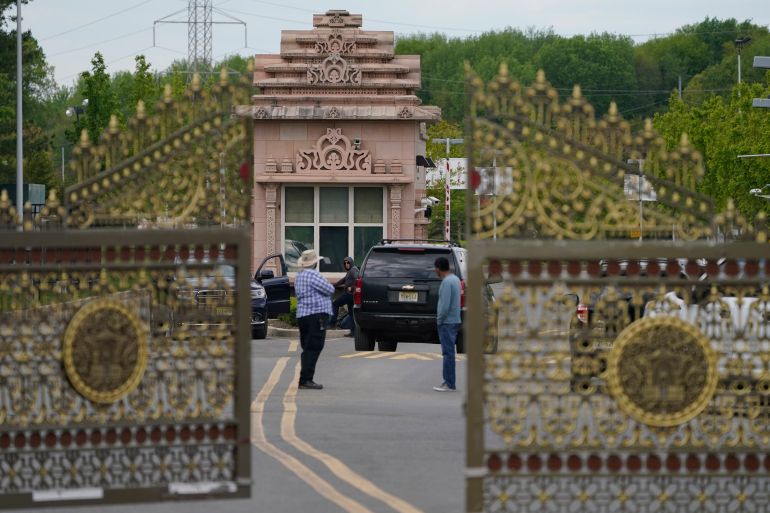Indian workers who built US Hindu temple file suit alleging abuse
The complaint, filed in the US District Court in Newark, New Jersey, on behalf of more than 200 Indian construction workers, alleges ‘shocking violations of the most basic laws applicable to workers in this country, including laws prohibiting forced labour.’

Hundreds of marginalised workers from India were recruited to build an enormous Hindu temple in New Jersey where they were forced to work long hours for low pay in violation of United States labour and immigration laws, according to a lawsuit.
The complaint filed on Tuesday in the US District Court in Newark on behalf of more than 200 Indian construction workers at the temple, alleges “shocking violations of the most basic laws applicable to workers in this country, including laws prohibiting forced labour”.
Keep reading
list of 4 itemsUS students pass resolution to end discrimination against Dalits
India’s COVID spike sees slight fall amid WHO warning on strain
The Casteless Collective: India’s musical activists
The suit, filed by five of the workers, accuses their employer, Bochasanwasi Shri Akshar Purushottam Swaminarayan Sanstha, or BAPS, and related entities of recruiting them in India, bringing them to the US and forcing them to work on the temple for more than 87 hours a week for $450 a month, or about $1.20 an hour.
Of that, the workers allegedly only received $50 in cash per month, with the rest deposited into their accounts in India.
New Jersey’s minimum wage is $12 an hour and US law stipulates the pay rate for most hourly workers rise to time-and-a-half when they work more than 40 hours a week.
The suit says the workers were kept under constant watch and were threatened with pay cuts, arrest and return to India if they spoke to outsiders.
FBI agents visit temple
On Tuesday, FBI agents visited the sprawling ornate temple – made of Italian and Indian marble – which sits on 162 acres (65 hectares) in rural Robbinsville, just east of Trenton.
“We were there on court-authorised law enforcement activity,” Doreen Holder, a spokeswoman for the Federal Bureau of Investigation field office in Newark, confirmed by telephone.
Holder declined to say how many agents were on the premises or elaborate on their mission.
BAPS CEO Kanu Patel, who is named as a defendant in the lawsuit, told The New York Times, “I respectfully disagree with the wage claim.”
A spokesperson for the organisation, Matthew Frankel, told The Associated Press that BAPS was first made aware of the accusations early Tuesday morning. “We are taking them very seriously and thoroughly reviewing the issues raised,” he said.
BAPS is also is linked to contentious issues in India, publicly supporting and funding a Ram temple in Ayodhya, built on the site of a mosque demolished by Hindu nationalists.
India’s right-wing prime minister, Narendra Modi, has close ties to the organisation and one of its transformative leaders, Pramukh Swami Maharaj, who died in 2016, The Associated Press said.
‘Modern-day slavery’
The plaintiffs, who claim to have worked on the temple as stone cutters and other construction workers as far back as 2012, said that in India, they belonged to Dalit community, formerly considered “untouchables” and socially ostracised.
Once on their construction jobs, the complaint said “they were forced to live and work in a fenced, guarded compound which they were not allowed to leave unaccompanied by overseers affiliated with (BAPS)”.
The lawsuit says more than 200 workers – many or all of whom don’t speak English – were coerced into signing employment agreements in India.
They travelled to New Jersey under R-1 visas, which are meant for “those who minister, or work in religious vocations or occupations,” according to the lawsuit.
When they arrived, the lawsuit says, their passports were taken away and they were forced to work at the temple from 6:30 am to 7:30 pm with few days off.
D B Sagar, president of the Washington-based International Commission for Dalit Rights, told The Associated Press that Dalits are an easy target for exploitation because they are the poorest people in India.
“They need something to survive, to protect their family,” Sagar – a Dalit himself – said, adding that if the allegations in the lawsuit are true, they amount to “modern-day slavery”.
An attorney representing several of the workers, Daniel Werner, called it “shocking that this happens in our backyard”.
“It is even more disturbing that it has gone on for years in New Jersey behind the temple’s walls,” Werner, of Decatur, Georgia, said on Tuesday outside the gates of the complex.